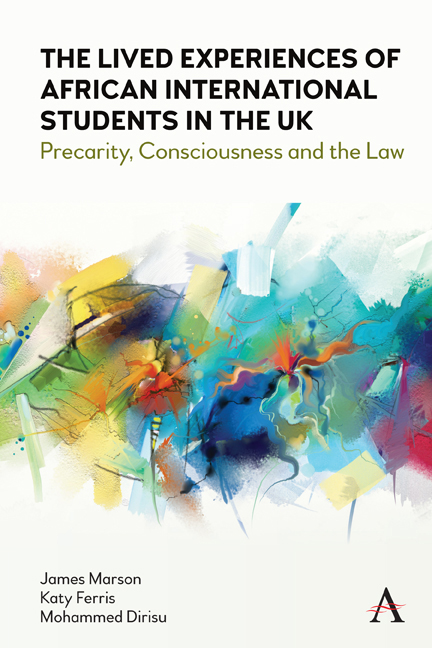 The Lived Experiences of African International Students in the UK
The Lived Experiences of African International Students in the UK Book contents
- Frontmatter
- Contents
- Preface
- Acknowledgements
- Legislation
- Case Law
- 1 Introduction
- 2 Methodology
- 3 Student Migration and Global Inequality
- 4 Migration as a Socio-Legal Phenomenon
- 5 The ‘Student-Migrant-Worker’ Meets ‘Precarity’
- 6 The ‘Utterly Transactional Worker’
- 7 Semi-Legal Working?
- 8 Conclusions
- Bibliography
- Index
7 - Semi-Legal Working?
Published online by Cambridge University Press: 13 September 2022
- Frontmatter
- Contents
- Preface
- Acknowledgements
- Legislation
- Case Law
- 1 Introduction
- 2 Methodology
- 3 Student Migration and Global Inequality
- 4 Migration as a Socio-Legal Phenomenon
- 5 The ‘Student-Migrant-Worker’ Meets ‘Precarity’
- 6 The ‘Utterly Transactional Worker’
- 7 Semi-Legal Working?
- 8 Conclusions
- Bibliography
- Index
Summary
Introduction
In this chapter we begin by documenting our findings of the various formations of semi-legality recognised within both cohorts of studentworkers, while noting the protections and insecurities peculiar to each group. Second, we analyse these issues through the framework of legal mobilisation and ‘claims-making’. This latter framework is chosen to help make sense of the various manifestations that semi-legality may have and how it impacts the emergence and transformation of disputes, as actors respond to potentially injurious and justiciable experiences in the workplace. In the final aspect of the chapter, we address the issues raised by the participants through the schema of legal consciousness, in particular as this impacts on the students’ lived experiences of migration rules which restrict and impact their employment opportunities while studying. This segues into a broader discussion of the varied semi-legal patterns of behaviour used as a medium for exerting socio-legal resistance, and a critique of semi-legality in the reification and continuation of legal hegemony. The findings presented here are founded on data collated from ethnographies of two cohorts of international students, identified here as Cohort A and Cohort B (see Chapter 6). This evidence is supplemented with data from interviews where necessary to verify and/or to expand upon the issues raised during the ethnography data collection phase. In reporting these findings in this chapter, participants from each cohort are tagged ‘A’ and ‘B’, respectively, followed by a number designating their (anonymised) identity.
Part One: Semi-Legality as a Dynamic Devise
The devises of semi-legality refer to the various mediums through which student-migrants blur the lines between legal and illegal conduct in respect of the state-prescribed restrictions on their employment while studying. This empirical undertaking is nuanced by the inherent precariousness that stems from being subjects of immigration control, engaging in what may be conceived as risqué behaviour. This is also contextualised by the risk of detection posed by the state through institutions including law enforcement, the Home Office and Her Majesty's Revenue and Customs (HMRC). In respect to ‘the whole government approach’, these institutions are tasked to work hand in hand so as to pre-empt and/or bring to account actors responsible for ‘illegal’ migrant labour (see Fudge 2018).
- Type
- Chapter
- Information
- The Lived Experiences of African International Students in the UKPrecarity, Consciousness and the Law, pp. 167 - 198Publisher: Anthem PressPrint publication year: 2022


